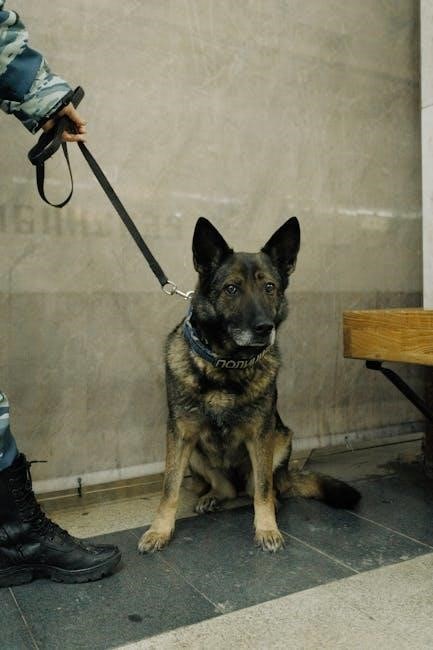Security guard exams assess knowledge of roles‚ legislation‚ and procedures. PDF resources offer multiple-choice and practical questions‚ preparing candidates for licensing and real-world scenarios effectively.
Why Security Guard Exams Are Important
Security guard exams are crucial for ensuring candidates possess the necessary knowledge and skills to perform their duties effectively. These exams assess understanding of legislation‚ emergency procedures‚ and patrol techniques‚ ensuring guards can handle real-world scenarios responsibly. By requiring exams‚ licensing bodies maintain high standards of professionalism and accountability in the security industry. Additionally‚ exams verify that guards are familiar with local laws and can apply practical skills‚ such as conflict resolution and access control. This process builds public trust in security services and ensures safety in various environments. Resources like PDF guides and practice questions help candidates prepare‚ making exams a vital step in becoming a qualified security professional.
Overview of the Exam Format
The security guard exam typically consists of multiple-choice and open-ended questions‚ assessing knowledge of roles‚ legislation‚ and procedures. Many exams include practical scenario-based questions to evaluate real-world application. Candidates are usually given a set time frame to complete the test‚ with questions covering topics like patrol techniques‚ emergency response‚ and access control. Some exams may also include fillable fields or image inserts for specific scenarios. The format varies by state‚ but most emphasize core competencies required for effective security work. Proper preparation involves understanding the exam structure‚ practicing with sample questions‚ and reviewing relevant study guides. This ensures candidates are well-equipped to handle both theoretical and practical aspects of the test.

Types of Security Guard Exam Questions
Exams include multiple-choice questions‚ testing knowledge of roles and legislation‚ and practical scenario-based questions‚ assessing real-world application of security protocols and emergency response skills effectively.
Multiple Choice Questions
Multiple choice questions are a common format in security guard exams‚ designed to assess knowledge of key concepts and procedures. These questions typically present four options‚ with one correct answer. They cover topics such as patrol techniques‚ emergency response‚ and access control measures. For example‚ a question might ask about the proper protocol during a fire evacuation or the legal authority of a security guard. PDF resources provide numerous practice questions‚ allowing candidates to familiarize themselves with the exam structure. Correct answers are often included‚ enabling self-assessment and improvement. This format ensures quick and objective evaluation of a candidate’s understanding of security principles and practices‚ making it an essential part of the licensing process.
Open-Ended Questions
Open-ended questions in security guard exams require detailed‚ descriptive answers‚ testing critical thinking and practical application of knowledge. These questions often present real-life scenarios‚ such as handling emergencies or de-escalating conflicts‚ and ask candidates to explain their actions and reasoning. Unlike multiple-choice questions‚ open-ended formats allow examiners to assess a candidate’s ability to articulate their understanding of security protocols‚ legal responsibilities‚ and ethical considerations. PDF resources often include sample open-ended questions‚ enabling candidates to practice articulating clear‚ concise responses. These questions emphasize the importance of effective communication and problem-solving skills‚ which are essential for security guards in high-pressure situations.
Practical Scenario-Based Questions
Practical scenario-based questions simulate real-life situations‚ assessing a candidate’s ability to apply knowledge in actual security incidents. These questions present hypothetical scenarios‚ such as responding to an emergency‚ handling unauthorized access‚ or resolving conflicts. Candidates must demonstrate critical thinking and adherence to protocols.
Examples include scenarios involving theft‚ medical emergencies‚ or trespassing. Answers require detailed explanations of appropriate actions‚ ensuring compliance with laws and procedures. These questions evaluate problem-solving skills and understanding of security protocols‚ preparing candidates for real-world challenges effectively.

Key Topics Covered in Security Guard Exams
Security guard exams cover roles and responsibilities‚ legislation‚ licensing‚ security procedures‚ patrol techniques‚ emergency response‚ and access control. These topics ensure comprehensive understanding and preparedness for real-world scenarios.
Roles and Responsibilities of Security Guards
Security guards are essential for maintaining safety and order in various settings. Their primary duties include enforcing laws‚ protecting assets‚ and ensuring the well-being of individuals. Key responsibilities involve patrolling premises‚ monitoring surveillance systems‚ and responding to emergencies. Guards must also maintain detailed incident reports and communicate effectively with clients or law enforcement; Exam questions often focus on scenarios requiring guards to enforce traffic rules‚ patrol public areas‚ or protect facilities. Understanding these roles is critical for passing licensing exams‚ as they reflect real-world expectations. PDF resources provide examples of such questions‚ helping candidates prepare for the practical aspects of the job.
Legislation and Licensing Requirements
Security guard exams extensively cover legislation and licensing requirements to ensure compliance with legal standards. Candidates must understand state-specific laws‚ permits‚ and regulations governing security practices. PDF resources highlight key areas such as mandatory training‚ background checks‚ and renewal processes. Questions often address scenarios requiring knowledge of legal detention‚ search protocols‚ and the limits of authority. Proper licensing ensures guards operate within legal boundaries‚ protecting both themselves and their employers. Exam questions also test familiarity with local laws‚ ensuring guards can apply regulations appropriately in real-world situations. This section emphasizes the importance of legal compliance in maintaining professional and ethical security practices.
Security Procedures and Protocols
Security procedures and protocols are critical components of a security guard’s training and exams. These include emergency response plans‚ such as fire evacuation and first aid‚ as well as patrol techniques to ensure thorough site monitoring. Access control measures‚ like ID verification and visitor logging‚ are also emphasized to prevent unauthorized entry. Protocols for handling suspicious activities‚ communication strategies during incidents‚ and proper use of equipment are frequently tested. Many PDF resources provide sample questions on these topics‚ ensuring candidates understand standard operating procedures and legal compliance. Practical scenarios often assess ability to apply protocols effectively in real-world situations‚ making this section vital for exam success and professional competence.

Common Security Guard Exam Questions
Common security guard exam questions often cover patrol techniques‚ emergency procedures‚ and access control measures. These topics are crucial for both exam success and real-life scenarios.
Questions on Patrol Techniques
Security guard exams often include questions on patrol techniques‚ assessing knowledge of effective surveillance and property monitoring. These questions may cover types of patrols‚ such as foot‚ vehicle‚ or stationary posts‚ and best practices for ensuring visibility and safety. Multiple-choice questions might ask candidates to identify the most appropriate patrol route or method for specific scenarios. Practical questions may present real-world situations‚ requiring test-takers to describe how they would conduct a patrol in a high-risk area or respond to suspicious activity. Such questions evaluate a candidate’s ability to apply theoretical knowledge to practical challenges‚ ensuring they can maintain security and safety in diverse environments. Reviewing study guides and practice exams can help candidates master this critical aspect of security operations.
Questions on Emergency Response Procedures
Security guard exams often include questions on emergency response procedures to ensure preparedness for critical situations. These questions assess knowledge of protocols for fires‚ medical emergencies‚ and evacuations. Candidates may encounter multiple-choice questions about the proper steps to take during a fire alarm or how to respond to a medical emergency. Practical scenario-based questions might present real-life situations‚ requiring applicants to outline the correct procedures. Understanding evacuation routes‚ first aid basics‚ and communication during emergencies is crucial. These questions evaluate a security guard’s ability to act calmly and effectively in high-pressure scenarios‚ ensuring public safety and asset protection. PDF resources provide sample questions to help candidates practice and master these essential response techniques.
Questions on Access Control Measures
Access control measures are critical in security operations‚ and exams often include questions on this topic. These questions may cover identification verification processes‚ surveillance systems‚ and protocols for granting or denying entry. Multiple-choice questions might ask about the best practices for monitoring access points‚ while practical scenarios could present situations requiring the application of access control procedures. For example‚ questions might focus on how to handle unauthorized individuals or manage emergency access. Additionally‚ some exams include topics like electronic access systems‚ visitor logging‚ and the importance of maintaining secure entry points. Understanding these concepts is essential for security guards to ensure the safety and integrity of the premises they protect. These questions help assess a candidate’s ability to implement effective access control strategies in real-world situations.
Soft Skills for Security Guards
Security guards need strong communication and conflict resolution skills to de-escalate situations. Customer service skills are also essential for interacting with the public effectively and professionally.
Communication Skills
Effective communication is crucial for security guards to interact with clients‚ colleagues‚ and the public. Verbal and non-verbal skills are tested in exams‚ ensuring guards can clearly convey information and interpret body language. Questions may focus on active listening‚ conflict resolution‚ and professional demeanor. Scenario-based questions often assess how guards would communicate during emergencies or disputes. Practicing with PDF resources helps candidates master these skills‚ as they encounter realistic dialogues and situation-based queries. Strong communication fosters trust and cooperation‚ making it a cornerstone of security training and licensing exams.
Conflict Resolution Techniques
Conflict resolution is a critical skill for security guards‚ often tested through scenario-based questions in exams. Active listening‚ remaining calm‚ and clear communication are essential techniques. Guards must assess situations quickly‚ prioritize safety‚ and de-escalate tensions without force when possible. Empathy and understanding the perspectives of all parties can prevent conflicts from escalating. Security guard exam questions often present real-life scenarios‚ requiring candidates to demonstrate effective resolution strategies. Stay composed and avoid confrontational language to maintain control. Proper training and practice in these techniques are vital for success in both exams and real-world applications. Mastering conflict resolution ensures guards can handle diverse situations professionally and ethically‚ aligning with legal and procedural standards.
Customer Service Skills
Customer service skills are essential for security guards‚ as they often interact with the public‚ clients‚ and employees. PDF resources highlight the importance of professionalism‚ empathy‚ and clear communication in handling complaints and providing assistance. Security guards must maintain a positive demeanor‚ ensuring a welcoming environment while upholding safety protocols. Effective customer service fosters trust and cooperation‚ which are critical in maintaining order and resolving conflicts peacefully.
Questions in security guard exams often assess scenarios where guards must balance enforcement with courtesy. For example‚ how to politely yet firmly address unauthorized access or resolve disputes. These skills are vital for building a positive reputation for both the guard and their employer‚ ensuring community trust and satisfaction. Study materials emphasize the need to practice these interactions to excel in real-world situations.
Security Guard Exam Preparation Tips
Utilize study guides and practice exams to familiarize yourself with question formats. Focus on time management to ensure all questions are answered thoroughly and efficiently during the exam.
Study Guides and Resources
Effective preparation for security guard exams requires access to reliable study guides and resources. PDF materials are widely available‚ offering comprehensive question banks‚ practice exams‚ and detailed answer explanations. These resources cover essential topics such as roles and responsibilities‚ legislation‚ and security protocols‚ ensuring candidates are well-prepared. Many guides include multiple-choice questions and practical scenarios to simulate real exam conditions. Additionally‚ some resources provide state-specific content‚ addressing variations in licensing requirements and regional challenges. Candidates can also find fillable forms for self-assessment and revision. Using these study aids helps individuals identify weak areas and improve their understanding of security procedures and laws. Regular practice with these materials ensures confidence and readiness for the exam‚ making them indispensable tools for success.
Practice Exams and Mock Tests
Engaging with practice exams and mock tests is a proven strategy to excel in security guard exams. These resources simulate real exam conditions‚ helping candidates familiarize themselves with question formats‚ such as multiple-choice and scenario-based queries. By attempting mock tests‚ individuals can assess their knowledge gaps and improve time management skills. PDF guides often include answer keys‚ enabling self-evaluation and focused studying. Regularly practicing with sample questions enhances confidence and ensures readiness for the actual exam. Mock tests also highlight areas requiring additional review‚ such as legislation or emergency protocols. Leveraging these tools is essential for achieving a high score and securing licensure in the security field.
Time Management Strategies
Effective time management is crucial for success in security guard exams. Candidates should allocate equal time to each question to avoid spending too long on one. Setting a timer during practice helps simulate exam conditions. Prioritize questions based on confidence‚ answering easier ones first to secure initial points. Skimming through the entire paper beforehand allows for better planning. Practicing with practice exams from PDF resources enhances speed and accuracy. Staying calm and avoiding overthinking is essential to manage time wisely. Reviewing answers at the end ensures no mistakes are left unchecked. These strategies help candidates efficiently complete the exam within the allotted time.

State-Specific Exam Variations
Security guard exams vary by state‚ with differences in licensing requirements‚ regional challenges‚ and local laws. PDF guides often include state-specific questions to address these variations effectively.
Differences in Licensing Requirements
Licensing requirements for security guards vary significantly across states. Some states mandate specific training hours‚ while others have different age or background check criteria. For instance‚ certain jurisdictions require a physical exam before licensing‚ while others focus on criminal history screenings. Training hours can range from minimal to extensive‚ depending on state regulations. Additionally‚ background checks may include fingerprinting and detailed personal history reviews. These variations mean candidates must familiarize themselves with their state’s particular rules. Exam questions often reflect these differences‚ ensuring guards meet local standards. Understanding these disparities is crucial for applicants to navigate the licensing process effectively. Always check state-specific resources for the most accurate and updated requirements.
Regional Security Challenges
Regional security challenges vary significantly based on geographical‚ cultural‚ and legal factors. Urban areas often face issues like crowd control‚ theft‚ and terrorism‚ while rural regions may deal with isolated incidents and limited resources. Natural disasters‚ such as earthquakes or floods‚ also pose unique threats in specific areas. Security guards must adapt to these challenges‚ understanding local laws and protocols. For example‚ some states require additional training for active shooter scenarios or wildfire evacuation procedures. PDF resources highlight these variations‚ offering insights into how regional threats shape exam questions. This ensures candidates are prepared to handle diverse security situations effectively‚ regardless of their location.
Local Laws and Regulations
Security guard exams often include questions on local laws and regulations to ensure compliance with regional requirements. These questions address state-specific licensing‚ legal authorities‚ and operational standards. For example‚ some jurisdictions require security guards to understand local arrest and detention laws‚ while others focus on specific protocols for access control or emergency response. PDF resources provide sample questions covering these topics‚ helping candidates prepare for region-specific challenges. Understanding local regulations is crucial for effective job performance and legal compliance. Exams may also test knowledge of regional security challenges‚ ensuring guards are prepared to handle location-specific issues. This focus on local laws ensures that security guards operate within legal boundaries and meet community expectations effectively.
Success in security guard exams requires thorough preparation using PDF resources‚ ensuring preparedness for both exams and real-world challenges through effective learning and continuous skill development.
Final Tips for Success
To excel in security guard exams‚ candidates should utilize study guides and practice exams to familiarize themselves with question formats. Focus on understanding legislation‚ security procedures‚ and practical scenarios. Reviewing patrol techniques‚ emergency response protocols‚ and access control measures is essential. Time management during the exam is crucial; allocate time wisely to avoid rushed answers. Additionally‚ highlight and revisit challenging topics to ensure comprehension. Leveraging PDF resources for practice questions can simulate real exam conditions‚ boosting confidence. Finally‚ staying calm and methodical during the test will help in making informed decisions. Continuous learning and adherence to these strategies will significantly enhance chances of success.
Importance of Continuous Learning
Continuous learning is essential for security guards to stay updated on evolving threats‚ laws‚ and best practices. Security guard exam questions and answers PDFs provide valuable resources to reinforce knowledge and adapt to new challenges. Regular review of these materials ensures proficiency in critical areas like emergency response‚ access control‚ and conflict resolution. By staying informed‚ security professionals can enhance their problem-solving skills and deliver effective services. Continuous learning also fosters career advancement and ensures compliance with licensing requirements. It enables guards to apply theoretical knowledge in real-world scenarios‚ improving public safety and organizational security. Ultimately‚ ongoing education is vital for maintaining professionalism and addressing dynamic security demands effectively.
